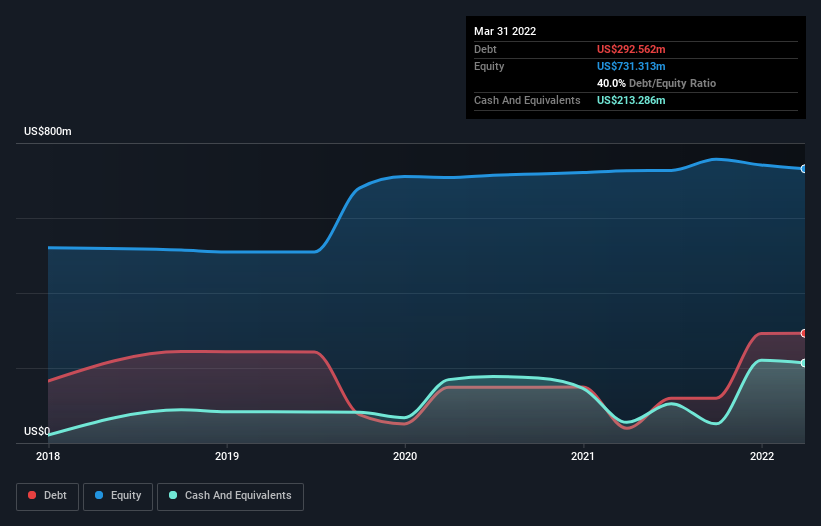Some say volatility, rather than debt, is the best way to think about risk as an investor, but Warren Buffett famously said that 'Volatility is far from synonymous with risk.' So it seems the smart money knows that debt - which is usually involved in bankruptcies - is a very important factor, when you assess how risky a company is. We note that Ping Identity Holding Corp. (NYSE:PING) does have debt on its balance sheet. But the real question is whether this debt is making the company risky.
What Risk Does Debt Bring?
Debt assists a business until the business has trouble paying it off, either with new capital or with free cash flow. Ultimately, if the company can't fulfill its legal obligations to repay debt, shareholders could walk away with nothing. However, a more usual (but still expensive) situation is where a company must dilute shareholders at a cheap share price simply to get debt under control. Having said that, the most common situation is where a company manages its debt reasonably well - and to its own advantage. When we examine debt levels, we first consider both cash and debt levels, together.
Check out our latest analysis for Ping Identity Holding
How Much Debt Does Ping Identity Holding Carry?
The image below, which you can click on for greater detail, shows that at March 2022 Ping Identity Holding had debt of US$292.6m, up from US$39.1m in one year. However, it does have US$213.3m in cash offsetting this, leading to net debt of about US$79.3m.

How Healthy Is Ping Identity Holding's Balance Sheet?
According to the last reported balance sheet, Ping Identity Holding had liabilities of US$113.0m due within 12 months, and liabilities of US$308.8m due beyond 12 months. On the other hand, it had cash of US$213.3m and US$135.7m worth of receivables due within a year. So it has liabilities totalling US$72.8m more than its cash and near-term receivables, combined.
Given Ping Identity Holding has a market capitalization of US$1.52b, it's hard to believe these liabilities pose much threat. Having said that, it's clear that we should continue to monitor its balance sheet, lest it change for the worse. The balance sheet is clearly the area to focus on when you are analysing debt. But ultimately the future profitability of the business will decide if Ping Identity Holding can strengthen its balance sheet over time. So if you're focused on the future you can check out this free report showing analyst profit forecasts.
In the last year Ping Identity Holding wasn't profitable at an EBIT level, but managed to grow its revenue by 26%, to US$315m. Shareholders probably have their fingers crossed that it can grow its way to profits.
Caveat Emptor
Even though Ping Identity Holding managed to grow its top line quite deftly, the cold hard truth is that it is losing money on the EBIT line. To be specific the EBIT loss came in at US$76m. When we look at that and recall the liabilities on its balance sheet, relative to cash, it seems unwise to us for the company to have any debt. So we think its balance sheet is a little strained, though not beyond repair. However, it doesn't help that it burned through US$9.7m of cash over the last year. So suffice it to say we do consider the stock to be risky. When analysing debt levels, the balance sheet is the obvious place to start. But ultimately, every company can contain risks that exist outside of the balance sheet. For example - Ping Identity Holding has 2 warning signs we think you should be aware of.
When all is said and done, sometimes its easier to focus on companies that don't even need debt. Readers can access a list of growth stocks with zero net debt 100% free, right now.
New: Manage All Your Stock Portfolios in One Place
We've created the ultimate portfolio companion for stock investors, and it's free.
• Connect an unlimited number of Portfolios and see your total in one currency
• Be alerted to new Warning Signs or Risks via email or mobile
• Track the Fair Value of your stocks
Have feedback on this article? Concerned about the content? Get in touch with us directly. Alternatively, email editorial-team (at) simplywallst.com.
This article by Simply Wall St is general in nature. We provide commentary based on historical data and analyst forecasts only using an unbiased methodology and our articles are not intended to be financial advice. It does not constitute a recommendation to buy or sell any stock, and does not take account of your objectives, or your financial situation. We aim to bring you long-term focused analysis driven by fundamental data. Note that our analysis may not factor in the latest price-sensitive company announcements or qualitative material. Simply Wall St has no position in any stocks mentioned.
About NYSE:PING
Ping Identity Holding
Ping Identity Holding Corp., doing business as Ping Identity Corporation, offers intelligent identity solutions for the enterprise in the United States and internationally.
Adequate balance sheet with concerning outlook.
Similar Companies
Market Insights
Community Narratives




